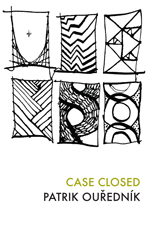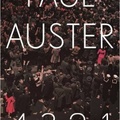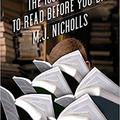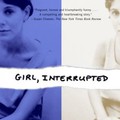Patrik Ouředník: Case Closed

It’s impossible for me to summarize the plot of this novel, since Case Closed doesn’t have a story proper. Instead, there are several disconnected storylines which sometimes seem to merge, and sometimes for a moment it seems that perhaps there is a regular story – but when you think you finally understand something, you always realize that there’s no real story after all. But to give you an idea of what this book is about, here’s a couple of storylines: among other things, Case Closed is about a murder case which happened forty years ago; about the suicide of an old woman; about a couple of mysterious fires; and about the rape of a young student who lost her way in the city. So, the novel is all about crime, and about mysterious cases which should be solved, but finding the solutions and uncovering the mysteries is not easy (or downright impossible) because the victims, the detectives and the suspects keep misunderstanding one another.
Just to give you an example: at the beginning of the novel, the student who will later be raped asks a jovial pensioner for directions. She wants to go the Academy of Fine Arts, but the old guy sends her in a totally different direction – just for the fun of it. While the girl is wandering around the streets, someone grabs her in a dark doorway and rapes her. Later, when she is interviewed by the police, the policeman doesn’t understand how she could have ended up in the street where she was raped if she claims that she was going to the Academy – which is in the other direction. The girl keeps repeating that she was indeed going to the Academy, and the policeman keeps wondering what she was doing in that particular street then. This is a misunderstanding which would probably be easy to resolve, but it seems impossible that the characters of this novel will ever be able to do this.
Because of the communication problems of the characters, the several different storylines, the constant merging of real events and dreams, and the all-permeating paranoia of the text, it is very difficult to understand everything here at first reading, but this is no problem for me. Reading Case Closed almost felt like reading a Thomas Pynchon novel: I had a fun time, despite the fact that I could only follow the events up the a certain point (rather early on) in the book, and after reaching that point, I was just going with the flow of the text and I didn’t try to understand everything. Especially since I have a hunch that perhaps after all there aren’t so many mysteries here to uncover and understand.
As it’s mentioned on the cover of the Hungarian edition, according to the writer / narrator of Case Closed, there are two possibilities here: either the writer is an idiot, or the reader. But I think it’s not absolutely necessary to choose from these options – it’s also possible that neither the writer, not the reader is an idiot. Ouředník is obviously not an idiot: his text is so witty, funny and clever that I rule out the possibility that he is stupid or that his mind is befuddled. And as regards the reader (in this case: me): I didn’t feel particularly stupid while reading this book. I know from my earlier reading of novels by Thomas Pynchon what it feels like when a book really does make me feel stupid. Well, Case Closed is far from invoking this unique feeling.
Anyway, I don’t mean this as criticism – Case Closed is a really clever, absurd and funny piece of postmodern literature.
Just to give you an example: at the beginning of the novel, the student who will later be raped asks a jovial pensioner for directions. She wants to go the Academy of Fine Arts, but the old guy sends her in a totally different direction – just for the fun of it. While the girl is wandering around the streets, someone grabs her in a dark doorway and rapes her. Later, when she is interviewed by the police, the policeman doesn’t understand how she could have ended up in the street where she was raped if she claims that she was going to the Academy – which is in the other direction. The girl keeps repeating that she was indeed going to the Academy, and the policeman keeps wondering what she was doing in that particular street then. This is a misunderstanding which would probably be easy to resolve, but it seems impossible that the characters of this novel will ever be able to do this.
Because of the communication problems of the characters, the several different storylines, the constant merging of real events and dreams, and the all-permeating paranoia of the text, it is very difficult to understand everything here at first reading, but this is no problem for me. Reading Case Closed almost felt like reading a Thomas Pynchon novel: I had a fun time, despite the fact that I could only follow the events up the a certain point (rather early on) in the book, and after reaching that point, I was just going with the flow of the text and I didn’t try to understand everything. Especially since I have a hunch that perhaps after all there aren’t so many mysteries here to uncover and understand.
As it’s mentioned on the cover of the Hungarian edition, according to the writer / narrator of Case Closed, there are two possibilities here: either the writer is an idiot, or the reader. But I think it’s not absolutely necessary to choose from these options – it’s also possible that neither the writer, not the reader is an idiot. Ouředník is obviously not an idiot: his text is so witty, funny and clever that I rule out the possibility that he is stupid or that his mind is befuddled. And as regards the reader (in this case: me): I didn’t feel particularly stupid while reading this book. I know from my earlier reading of novels by Thomas Pynchon what it feels like when a book really does make me feel stupid. Well, Case Closed is far from invoking this unique feeling.
Anyway, I don’t mean this as criticism – Case Closed is a really clever, absurd and funny piece of postmodern literature.





